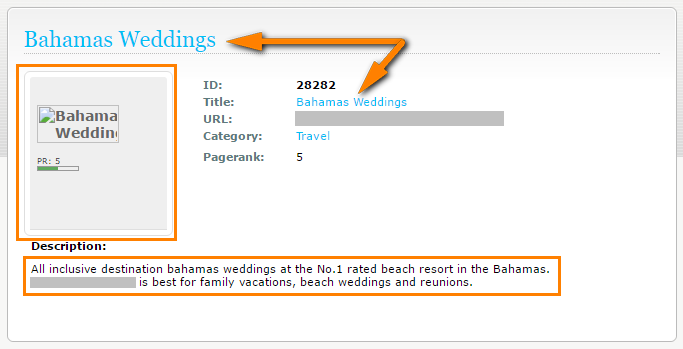I’m sure you know how important backlinks are for SEO.
And I’m also sure that you’ve already heard how not all backlinks are made equal. In fact having some types of backlinks could hurt your site’s rankings, and even result in a Google penalty.
The trouble is, how can you tell which ones are which?
Well, that’s what I’m going to help you with today.
In this post, I’ll show you 7 backlink types you should avoid at all cost if you want your site to rank in Google.
Intrigued? Let’s do it then.
[thrive_leads id=’1806′]
Why Some Backlinks Are Bad for SEO?
The answer is simple:
Because Google considers them a way to manipulate website rankings.
In their guidelines for all website owners, Google states very clearly that anyone trying to manipulate its rankings could have their website or at the very least the page in question penalized by removal from its index.
Because Google places a lot of emphasis on backlink profiles when ranking web pages, and because links are hard to get, people look for shortcuts to get more links.
For example, they buy links and take part in link exchange schemes.
Unfortunately, Google clearly states that these methods, and many others, violate its guidelines.
Which is why we urge you to stay within the parameters set out by Google and avoid doing anything that could lead to a penalty.
What’s more, only recently, it decided to make the Penguin update a part of its ranking algorithm, meaning that it can now monitor and penalize a website for having spam links in real-time.
So, what are the backlink types you should avoid if you want your site to rank?
#1. Purchased Links
Let’s not beat around the bush here:
Google hunts down anyone buying links and penalizes sites found to be doing so.
And that even includes well-known brands.
The problem? It’s easy to fall prey to link sellers.
Companies selling links might dress it up as “buying advertising space” or “buying advertising,” which you might see as a legitimate marketing technique.
However, in the eyes of Google, that “advertising space” is actually a link you’ve bought to manipulate Google and improve your website’s rankings.
Here’s a screenshot from Google’s official guidelines on Link Schemes explaining this.
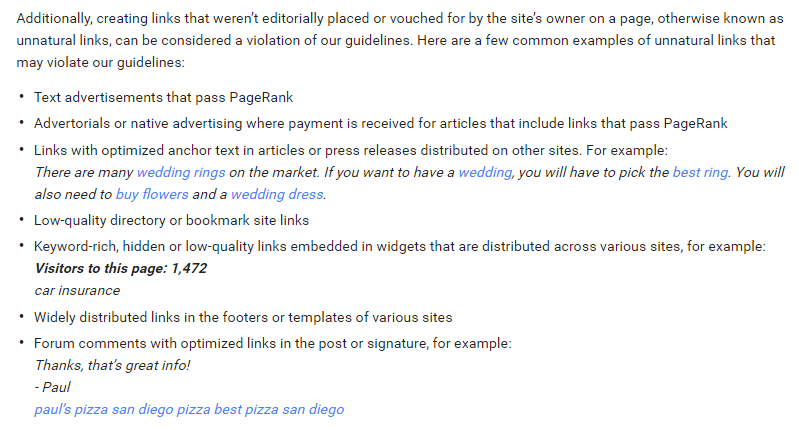
#2. Private Blog Networks (PBNs)
A private blog network is a group of blogs or websites typically owned by one person and set up for the sole purpose of selling links. The websites within the network usually have only a few pages of content and rarely get updated.
The average person stumbling across one of these websites wouldn’t know they were part of a network. More than likely, they’d think the site was abandoned.
However, these sites often sell link space.
The owner of a blog network lets you place a link back to your website in one of two ways:
- By publishing a brand new article which contains your link.
- By placing your link into an already published article.
Of course, the owner of the network doesn’t provide this service free of charge. Which means anyone placing links on a private blog network buys links to manipulate Google’s algorithm to boost their rankings.
Since 2012 Google has been tracking and shutting down private blog networks.
And when the search engine finds a blog network, it de-indexes all the sites within it. As a result, website owners lose their links and potentially expose their sites to a penalty for buying links.
#3. Spammy Blog Comments
Let’s face it:
Adding a generic comment on a blog stands little chance of helping your IT website improve its rankings.
For one, Google discounts these types of links because they’re not part of the main editorial content or placed there by the site’s owner.
Also, if your site gets hit by a penalty further down the line, and you’ve used spammy blog comments as a linking tactic, removing them is particularly difficult and costly.
Here’s an example of a couple of spammy comments on a live blog.
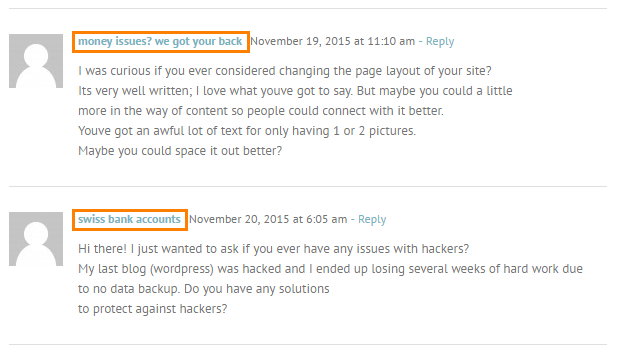
#4. Sponsored Posts Without Full and Proper Disclosure
A sponsored post is an article written by you or on your behalf for publishing on a website you don’t own. These articles are similar to guest posts, but differ slightly because a) you usually pay for a sponsored post and b) they’re more self-promotional than your average guest post.
The biggest issue with using sponsored posts as a link building strategy is disclosure.
The Federal Trade Commission frowns upon sponsored posts without disclosure because they could be seen as false advertising.
Google doesn’t like them because, essentially, you’re paying for a link designed to boost your rankings and there is little, or no editorial control.
Should this put you off using sponsored posts as a method for marketing your website? No. It’s legitimate. As long as the site publishing your post discloses your business relationship on the same page as the article.
After all, even large companies like Microsoft do it.
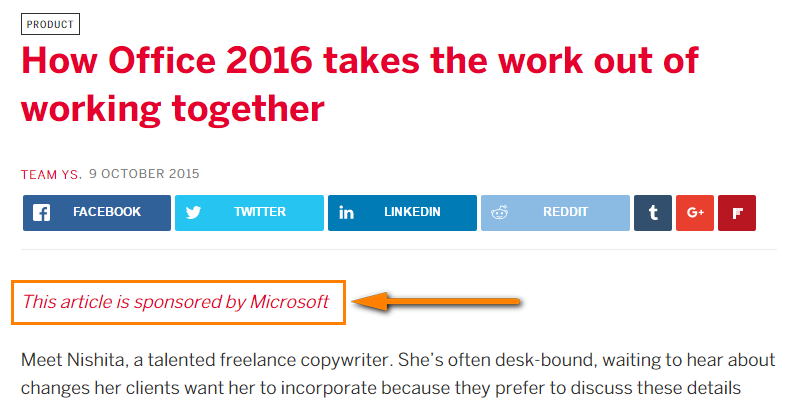
However, make sure that the site you’re placing a sponsored post on displays a full disclosure.
#5. Sitewide Footer or Sidebar Links
A lot of bloggers and webmasters cram a multitude of links into their site’s sidebar and footer areas.
The average reader doesn’t take much notice of what’s in these two areas of a website, so it’s easy for the owner to sneak in links designed to manipulate Google’s algorithm.
If you come across a site displaying lots of links with keyword rich anchor text – ie. the exact words the average person types into Google when they’re searching for goods or services – you can be almost certain some, if not all, of those links are paid for and violate Google’s webmaster guidelines.
Example:
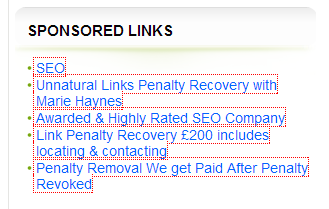
#6. Non-Relevant Reciprocal Link Exchanges
Exchanging links seems like an easy way to get more links, right?
All you need to do is link to someone, and they’ll link to you back.
But tempting as this strategy may seem, avoid it.
Before going further, let me say it’s okay for you to link to websites you do business with if the link is relevant. If you want to recommend a consultant or another IT firm, that’s fine. If they want to link to you, that’s fine too.
These types of link won’t hurt your rankings.
Link exchanges become a problem when you swap tens or hundreds of links with businesses outside your industry.
The links might be within articles rather than the sidebar or footer, as mentioned earlier, but they don’t look right to Google’s search bot.
#7. Profiles on Low-Quality Directories with no Editorial Control
Let’s make something clear:
On the whole, creating profiles on business directories isn’t bad.
In fact, it’s a surefire way to boost your local SEO rankings.
It’s using low-quality directories that will hurt your rankings.
You see:
Not all web directories are created equal.
Some offer editorial control. This means that they’ll manually review your website and listing before approving it.
Others, however, publish links from anybody. And these are the ones you should avoid.
How can you tell the difference?
- Look for a ‘recent rejections’ page. If a directory has one – great. It means that real people look after the site and reject spam.
- Look at the listings in competitive niches such as credit cards, mortgages, travel, etc. If you see a lot of keywords in the links rather than company names, it’s a good sign the directory provides little editorial control.
- Adult content. Check to see if the directory links to adult content. If it does, it’s another one to avoid.
- Age. Look for aged directories. Ones like Best of the Web are years old and trusted by Google. Of course, you can’t rely on age every time.
- Gut feeling. You can tell a lot from how the site makes you feel. If you have a bad first impression about the site, proceed with caution.
Here’s a sample of a listing from a low-quality directory with little, or no editorial control. The arrows point to keyword rich links, which point to the main domain, the missing image should contain a thumbnail of the website and the description is full of grammatical errors and doesn’t make much sense.
Final Thoughts
Fact:
You need backlinks if you want your site to rank.
The trouble, however, is that some backlink types could hurt your SEO, and even result in a Google penalty.
Luckily, now you know which backlink types to avoid.
[thrive_leads id=’1806′]
Sign up below to receive our monthly IT Services advice + other cool stuff straight to your inbox.
